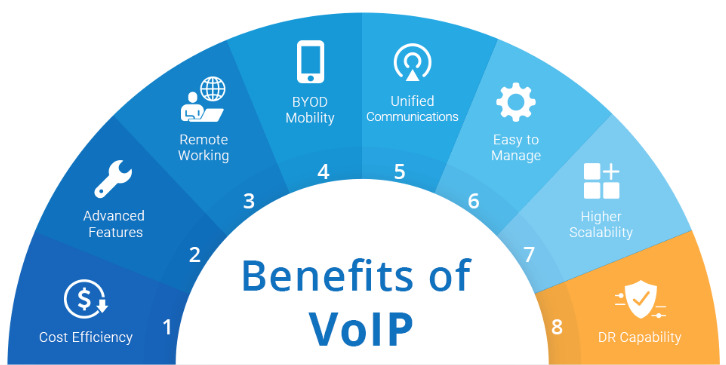The Voice Over Internet Protocol (VoIP) market is booming.
VoIP technology revenue exceeded $30 billion in 2020, with growth predictions of 15% by 2027.
This shift to the VoIP telecoms industry is primarily thanks to the widespread enhancement of internet technologies. The advantages of VoIP compared to traditional landlines are considerable for businesses, with cost being the main factor.
Included in this article are seven benefits of small business VoIP worth exploring for your organization’s needs. Saving money is great, but there are many other aspects of VoIP that can help drive your business forward and make your customers happier.
What Is VoIP?
VoIP transmits voice conversations through packets of data. These data packets are routed across internet connections instead of regular landlines. VoIP technology requires a high-speed internet connection with a router and modem.
As VoIP technology runs over the internet, all associated data is stored in the cloud. VoIP enables you to make and receive high-quality and stable voice and video calls from any data-driven device. In addition, VoIP functionalities for business purposes include SMS and instant messaging and call recording features.
So how can VoIP technology help your business?
1. Money-saving
Smart businesses everywhere seek opportunities to decrease company costs and increase revenue. Implementing VoIP is certainly an aspect of business expenses that your organization can reduce.
There are many ways that VoIP technology is cheaper than standard telephone lines. Firstly, there is no expensive hardware, and call costs are typically lower due to zero line rental fees. VoIP provides like Cmitsolutions consistent and predictable telephony costs and avoids staff expenses for mobile phone bills.

Small business VoIP options require minimal IT and support, which reduces costs even further. Associated costs are saved from VoIP integration, including:
- Time savings: VoIP streamlines business operations and enables employees to reduce the time taken for manual office tasks.
- Automating customer service: less time troubleshooting on calls allows team members to facilitate self-serve methods for customers on inbound calls.
- Call routing: forwarding calls to the relevant staff member saves time and endless games of phone tag.
Pro Tip: if your business makes frequent international calls, the cost savings are significant as long-distance VoIP calls are often toll-free.
2. Flexibility
A VoIP system offers businesses the flexibility to enable remote working with ease. Subject to a stable internet connection, employees can work from anywhere and communicate over the internet. Intuitive VoIP apps allow easy collaboration and interactivity features for remote and office-based workers alike.
VoIP phone numbers are portable and integrate with mobile devices such as those that run on iOS and Android, which is ideal for remote workers traveling to and from meetings requiring access to phone calls.
Pro Tip: share the same business number with various employees.
3. Feature-rich
VoIP delivers so much more than just a phone facility. Customizable caller IDs, file sharing, video conferencing, and collaboration are simple using just one dashboard. Integrate your CRM with your VoIP system at no additional cost to improve the entire customer service experience.
As VoIP is run on a converged data network rather than dedicated phone lines, conference call capabilities are smooth and efficient. VoIP systems enhance business operations by maximizing productivity.
Some advanced features of small business VoIP systems that you could use for your organization’s benefit include:
- Call queues: manage the distribution of your business’s calls and work to reduce the average call waiting time.
- Auto-attendant: acting as a virtual assistant, this feature helps answer, escalate, and direct inbound calls with ease.
- Virtual voicemail mailboxes: individual mailboxes are managed virtually.
- Number porting: a permanent business phone number is great for business longevity. Number porting with VoIP enables complete accessibility.
- Business text messaging: send SMS messages from desktop apps for convenience.
- Call analytics: establish valuable data to drive your business forward and use for training opportunities.
- IVR (interactive voice response): customers can interact with your business’s real-time messages to self-serve their queries.
- Video conferencing: quickly meet with customers and colleagues in online meetings.
- Conference calling: meet with global colleagues and customers online efficiently.
- Voicemail to text: it’s great for remote workers. This feature delivers voicemail-to-text transcription, so the message is clear and easily actioned.

4. Customer-friendly
To compete with other businesses, it’s essential that your communication methods are robust. VoIP allows your business to route calls efficiently and manage voicemails quicker than you can ask, “What is automatic call distribution?”.
VoIP services enable your customers to reach out to your business at a time convenient to them, which could be at any time of the day. Auto-attendants come into their own in these scenarios. Customize messages with holiday-related information and information for customers to manage their call options. Providing call routing features through your VoIP system means you can optimize the customer journey across all communication channels.
Pro tip: use your VoIP system to e-fax sensitive documents and keep on top of important paperwork demands.
5. Fuss-free
VoIP telephony solutions are usually nice and easy to set up and maintain. As a rule, VoIP technology is user-friendly and offers familiar software functionalities for users. Most VoIP systems can be set up on the same day without any external costly installation processes. It’s simple to add and remove lines at your business’s discretion, too.
Depending on your business’s current infrastructure and setup, VoIP service installation can either be remote or in-person by your provider. Due to the intelligible nature of VoIP systems, you can take charge and choose customizations that benefit your business in the best way, all without having to wait for a telephone provider to make changes for you.
6. High-quality
The latest innovations in VoIP software allow for exceptional quality voice and video calls without any dropped call fiascos. As long as the bandwidth is available, the quality of VoIP communications will be great. VoIP calls are prioritized, so even if your business’s internet connection is busy, your VoIP calls should get through.
7. Scalability
VoIP enables businesses to scale with the option for additional phone lines in the event of new hires and growing business demands.
For example, a business branching out into different types of software offerings would require extra recruitment drives and more support. Add in desk phones, when necessary, and scale up your business rapidly – without investing in costly telephony hardware and extra lines.

VoIP Integration Examples
Coming up are just some examples of how VoIP technology increases flexibility and collaboration in businesses:
- Virtual call centers focussing on marketing and sales
- Automating customer support functionalities
- Setting up remote-working teams
- Facilitating post-call surveys using CRM systems
- Generate KPIs on customer contacts
- Installing interactive voice response
Choosing a VoIP System That Works With Your Business
As with many other services, VoIP systems vary according to the provider. To choose the right VoIP service for your business, there are some considerations to bear in mind.
Voice Quality Factors
A network provider that runs on a dedicated IP is likely to deliver better quality VoIP voice and conference calls.
Training and Support
Check the training and support materials supplied by your service provider for onboarding purposes. If your business operates on a 24/7 basis, ensure that your VoIP providers are on hand to assist with support queries.
VoIP Features
Every business’s needs are different, so enquire about all the different features and make sure they tick your company’s boxes.
Pricing Structures
Are the VoIP features fixed-price? Verify whether they are, as a consistent price will benefit your business’s financial planning projections.
VoIP Analytics
If analytics is important to your business, see the reporting functionalities available so you can track call duration, hold times, wait times, and average usage across the business.
Integrations
Establish that the VoIP system you’re considering is compatible with the third-party applications that you already have in place.
Security
There are vital security aspects to consider with a new provider, especially as VoIP services run over the internet and are susceptible to cyber-attacks. Look for features such as end-to-end encryption, multi-factor authentication, and secure protocols.

The Future Is VoIP
Legacy telephone systems had their place and use. But the modern way of working now demands an updated telephony and communications solution. A VoIP system delivers multiple functionalities that are beneficial for your business and will enable your organization to scale when required.
To sum up, VoIP technology:
- Reduces associated telephony costs
- Saves time with collaboration features
- Simplifies communications across the entire business
- Allows for telephone customization options when required
- Integrates with third-party apps and programs for enhanced communication options
An increase in productivity comes as standard with VoIP installation. Team members can send sensitive documents, conduct virtual calls and meetings, share data, and collaborate easily using VoIP technology. All of this is at a lower rate than traditional telephony solutions, which is money that can be spent on other areas of your business, such as marketing and new product launches.
Choose the best business VoIP system, streamline your operations, and set your business’s team up for success today.
About the Author

Severine Hierso is EMEA Senior Product Marketing Manager for RingCentral Office, the leader in cloud communications solutions, and is passionate about creating value, differentiation and messaging, ensuring a better experience for customers and partners.
She has gained extensive international Product Marketing, Market Research, Sales Enablement and Business development experience across SaaS, Telecommunications, Video Conferencing and Technology sectors within companies such as Sony, Cisco, Cogeco Peer 1 and Dimension Data/NTT. Severine has written for domains such as Brightpearl and Stevie Awards.




































